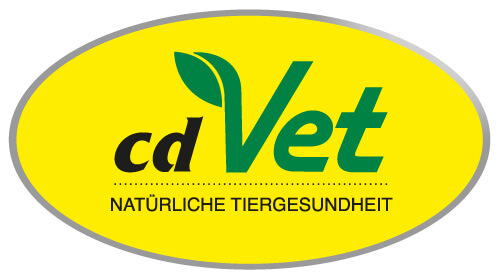To make tail strokes superfluous
Flies and mosquitoes are not only annoying (especially in summer!), but also pose a special health risk. Other parasites, such as mites, fleas, worms and ticks are a danger too, horses should receive support for natural protection. Here you will find help from the products of cdVet.
Filter products

EquiGreen insektoVet Herbal 3 kg
Complementary feed for horsesFeeding-related support of the skin metabolism, 100% naturalEquiGreen insektoVet Herbal has been developed for nutrition-related support of the skin and metabolism of horses before and during the insect season. Among the vermin that bother the horses are especially ticks, mites, mosquitoes, etc. This is where a natural skin condition is of importance for our horses.In cell biological studies it could be shown that the resistance of the skin cells can be enhanced throughout the year by EquiGreen insektoVet Herbal. In particular, the barrier function of the skin cells is strengthened, which also has an important role in the natural regenerative power of the skin.feeding-related strengthening of the skin cellscan contribute to an enhancement of the skin milieusupports the skin metabolismExpert tip: Of course, EquiGreen insektoVet Herbal can be combined with other cdVet products against ticks such as insektoVet Combi SpotOn and insektoVet Combi Spray.Composition: linseed expeller, black cumin seed expeller, brewers’ grains, brewers‘ yeast, grated coconut, carrot pomace, savory, rockrose.Analytical constituents: crude protein 25.5%, crude fiber 10.8%, crude fat 14.3%, crude ash 5.7%, sodium 0.04%, calcium 0.55% phosphorus 0.59%.Feeding recommendation: 20 g/100 kg body weight daily. 1 tbsp. corresponds to approx. 7.4 g.
Content: 3 Kilogramm (€17.98 / 1 Kilogramm)
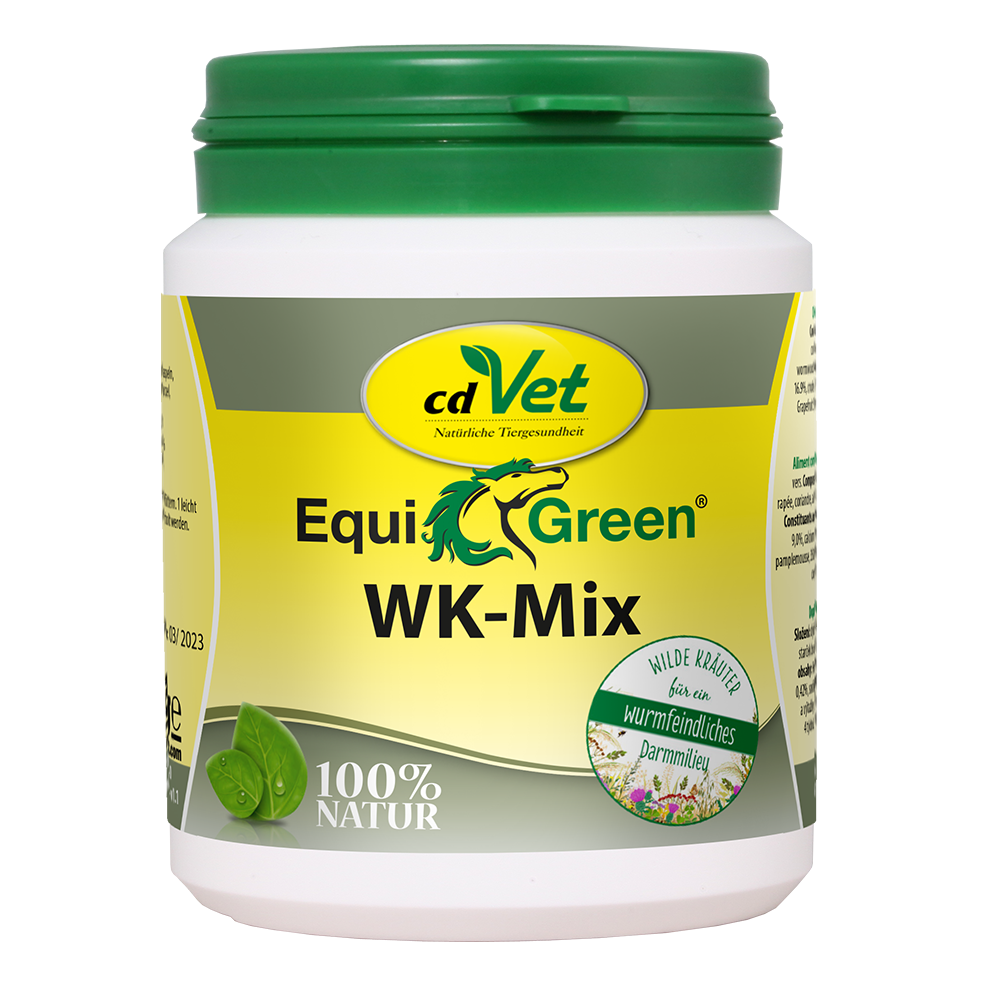
EquiGreen WK-Mix 75 g
Complementary feed (powder) for horsesWild herbs for an intestinal ambience hostile to wormsEquiGreen WK-Mix has been developed for the special nutritional needs that arise in connection with colonization by worms. The lack of herbal ingredients, such as saponins, bitter substances, and tannins, can make our pets susceptible to excessive colonization by worms. In contrast to their conspecifics living in the wilderness, they often do not have the opportunity to absorb those substances through plants and herbs. However with their wild relatives, precisely these substances lead to avoid an excessive, pathological colonization by worms.In order to have less often a reason for chemical deworming cures, the animal‘s intestine should therefore be supported with appropriate herbs that are contained in EquiGreen WK-Mix. Besides of a balanced diet, you can achieve this by the occasional addition of the complementary feed EquiGreen WK-Mix, which can compensate for the lack of herbal ingredients, such as saponins, bitter substances and tannins. In addition, many specialists for parasitology recommend checking the colonization by worms of the animal by regularly monitoring the faeces samples.Composition: pumpkin seeds, carrot pomace, walnut leaves, coconut grated, ash bark, rose hip fruit, coriander fruit, wild garlic herb, southernwood herb, dandelion root, thyme leaves, dandelion herb, lemon balm leaves, wormwood herb.Additives/kg: Flavouring compounds: oregano oil 4.5 g.Analytical constituents: crude protein 15.8%, crude fat 10.2%, crude fiber 16.9%, crude ash 9.0%, calcium 1.01%, phosphorus 0.42%, sodium 0.13%.Feeding recommendation: Add 1 g/100 kg body weight to the feed daily for 4 weeks. 1 tsp corresponds to ca. 2 g. Feeding should be repeated every 3 months.
Content: 0.075 Kilogramm (€239.33 / 1 Kilogramm)
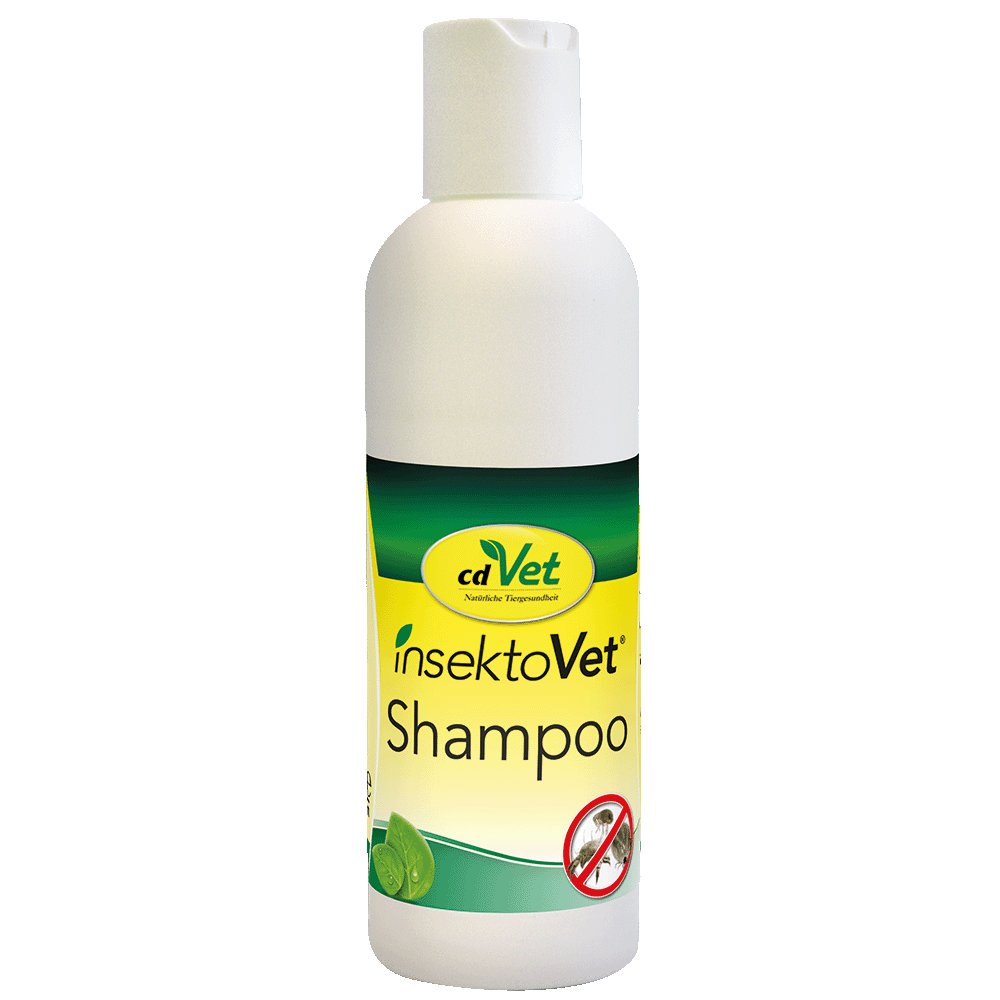
insectoVet Shampoo 100ml
RepellentShampoo as a defense against insects with geraniolWith its combination of essential oils insektoVet Shampoo provides an alternative to the usual synthetic toxins.- Contains the unique plant active ingredient geraniol- Rapid onset of action- The natural pH of the animal skin adapted to (pH 7)- No formation of resistance possible- Maximum protection against fleas, mites and other pests- Distributes non-annoying parasites and obviates reinfection- Also suitable for young dogs and puppies- Pleasant fragrance by essential oils- 100% biodegradableExpert Tip: Also suitable for cats!Composition: Aqua, Cocamidopropyl Betaine, Lauryl Glucoside, Methylpropanediol, Coco-Glucoside, Carprylyl Glycol, Citrus Grandis Peel Oil, Cymbopogon Winterianus Herb Oil, Geraniol, phenyl propanol, Sodium HydroxideActive ingredient: geraniol 1 g/kg, BAuA Reg.-No. N-63622.Instructions for use:Dilute before use 1:5. Massage into wet coat. After 2 - 3 min rinse well. Then repeat the process and allow the animal to stand for about 5 minutes in the foam. Then again, rinse thoroughly.Use biocides safely. Always read the label and product information before useAvoid eye contact! Keep out of the reach of children!
Content: 0.1 Liter (€129.50 / 1 Liter)
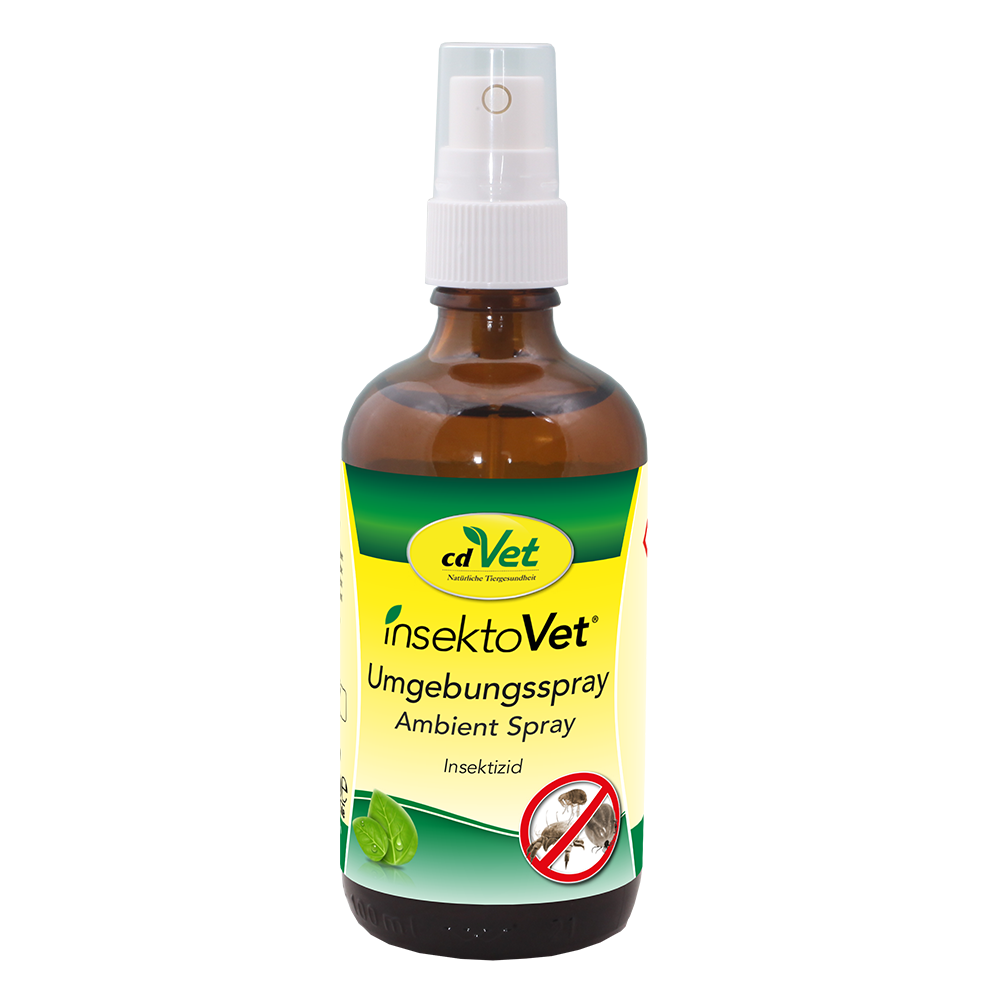
insektoVet Ambient Spray 100 ml
InsecticideInsecticide for the control of crawling insects in all stages of developmentinsektoVet Ambient Spray reliably controls crawling and stinging insects in all stages of development. Geraniol from the leaves of palmarosa geranium grass as an essential oil destroys the chitinous shell and gums up the tracheal respiration of pests of all kinds, arachnids and insects (ticks, mites, fleas, lice, moths, mosquitoes, cockroaches, ants, and horse biting lice), whereupon they dry out.acts immediately and reliablyagainst fleas, lice, ticks, mites and other crawling and stinging insects in all stages of developmentfor dogs‘ and cats‘ living, resting and lying placesalso applicable in the surrounding of young animals (from 4 months)no waiting time before re-entry after applicationalso excellent for prophylactic applicationpleasant fragranceActive substance: Geraniol 29 g/L. BAuA Reg.-No.: N-102123. With the active substance from the leaves of palmarosa geranium grass (Cymbopogon martinii).How to use: Treatment of the surroundings of dogs or cats: spray on all areas where the animal stays. Sleeping and lying places, such as basket, blanket, etc., require preferential treatment. Control hidden sitting vermin by thoroughly spraying the hiding places and nests from a distance of approx. 5 cm. Before the first treatment, check sensitive surfaces for compatibility and material resistance.Application rate: approx. 5 ml/m². Up to 250 ml bottle: 1 spray = ca. 0.15 ml. From 500 ml bottle: 1 spray = ca. 1.3 ml. Shake before use!Storage not below 18°C.WARNING • Contains geraniol. May produce an allergic reaction. Causes serious eye irritation. Keep out of reach of children. Avoid breathing mist/spray. Wear protective gloves/protective clothing/eye protection/face protection. IF ON SKIN: Wash with plenty of water and soap. IF IN EYES: Rinse cautiously with water for several minutes. Remove contact lenses, if present and easy to do. Continue rinsing. If eye irritation persists: Get medical advice/attention. If skin irritation or rash occurs: Get medical advice/attention. Dispose of contents/container to an authorized waste disposal site. Use biocides safely. Always read the label and product information before use.
Content: 0.1 Liter (€149.50 / 1 Liter)
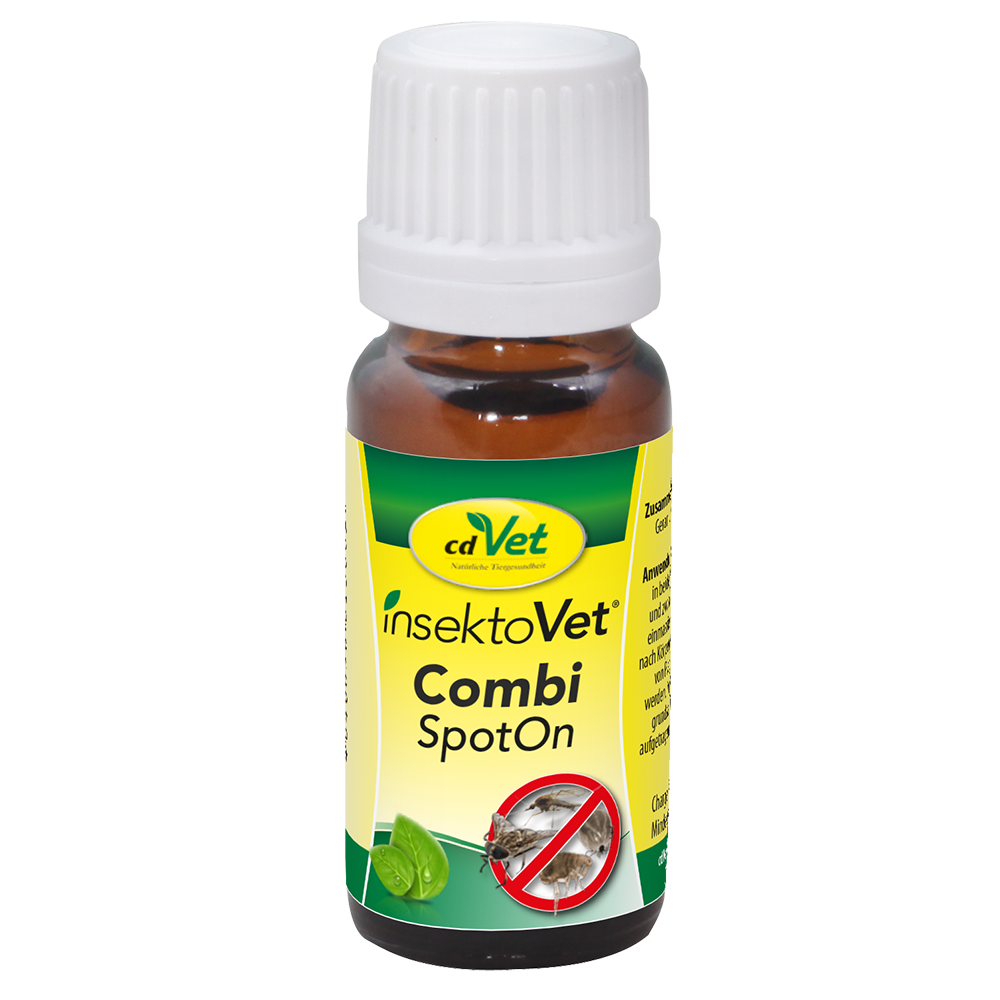
insektoVet Combi SpotOn 10 ml
Care product for animalsCare oil for odor masking against ticks and other pestsinsektoVet Combi SpotOn is a skin-care fragrance oil that masks the animal‘s own odor. The animal is no longer perceived by insects and pests as an attractive host worth attacking. insektoVet Combi SpotOn is a high-quality, skin-care oil, based on cold-pressed Egyptian organic black cumin oil and organic coconut oil. This unique composition is complemented with selected essential fragrance oilsthat masks the animal’s own odor.long-lasting masking properties against pests such as ticks, fleas, mites, mosquitoes, horseflies, etc.masks the animal‘s own odor100% naturealso suitable for young animalslow application quantity (10 ml sufficient for one season for dog/rodent)easy application, ready to useskin friendlyExpert tip: insektoVet Combi SpotOn is basically waterproof in rain and when bathing in water. However, it should be reapplied after shampooing. Of course, insektoVet Combi SpotOn can be combined with our other cdVet products such as TickEx herbal and TickEx Organic Oil.Composition: organic coconut oil, organic black cumin oil, jojoba oil, neem oil, geranium oil, lavender oil, manuka oil.How to use: Massage 1 drop from your wetted finger into the skin daily for 3 weeks. Dog: in both ear cones or between the shoulder blades and at the base of the tail. Horse: near the torso on the insides of the legs as well as at the base of the ear. Rodent: only 2 x per week between the shoulder blades. 1 drop corresponds to approx. 50 mg.Once basic stabilization is achieved, 1-2 applications weekly are sufficient. In case of strong regional infestation of pests, the frequency of applications can be increased individually.Contains lavender oil, citronellol, and geraniol. May produce an allergic reaction.
Content: 0.01 Liter (€1,795.00 / 1 Liter)
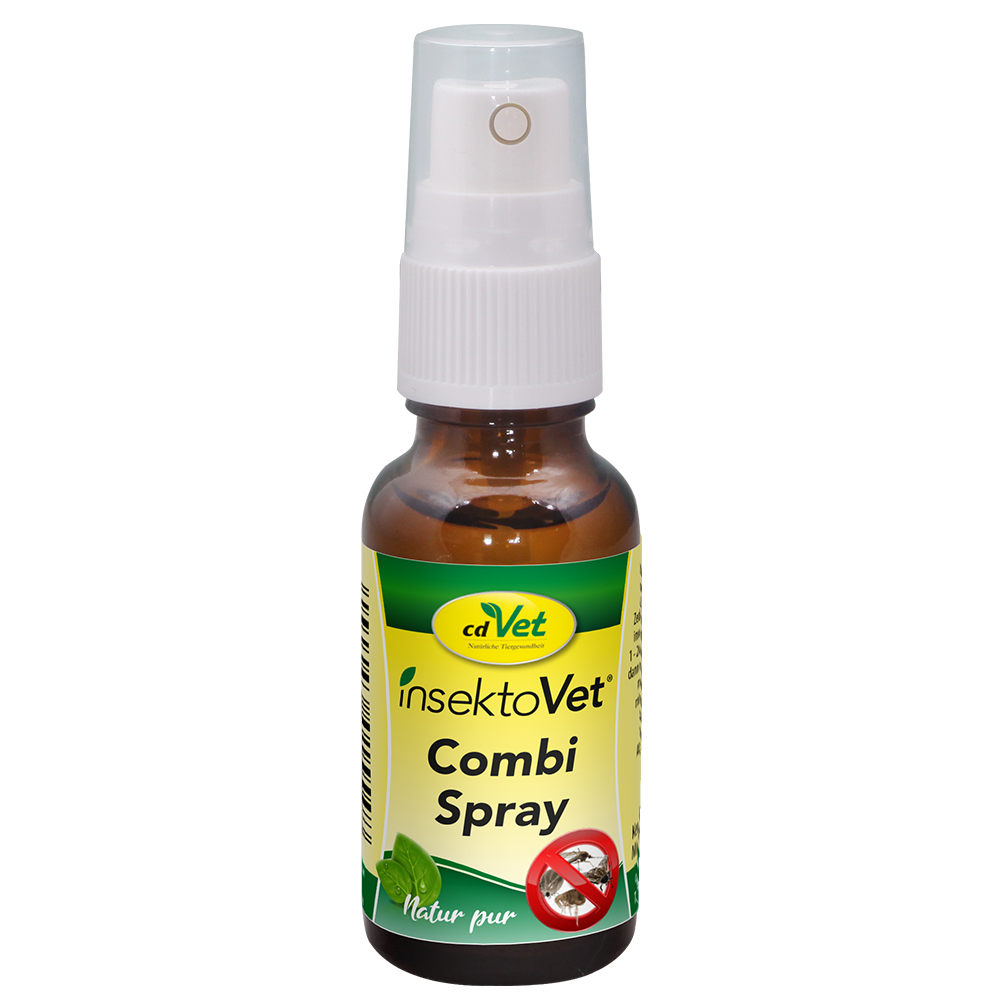
insektoVet Combi Spray 20 ml
Care product for animalsFragrance oil spray for animal-specific scent coverage against nuisances - from flea, mosquito and horsefly to tickWith insektoVet Combi Spray, cdVet has developed a revolutionary product that effectively and sustainably masks your pet against summer nuisances from flea, mosquito and horsefly to tick. The basis for insektoVet Combi Spray is a unique combination of various essential oils, which are an impenetrable firewall for the highly sensitive olfactory organs of insects without straining the olfactory nerves of humans and quadrupeds.insektoVet Combi Spray is gentle to the fur and skin of the animals, has a long-lasting and intensive effect - a MUST for every pet owner.masks animal‘s own scentalso suitable for young animals (from 4 months on)pure plant based - 100% naturalpleasant, fresh scenteasy application, ready to useExpert tip: Of course, insektoVet Combi Spray can be combined with our other cdVet products such as insektoVet Herbal and insektoVet Coconut-Black Cumin-Oil.Composition: cedarwood oil, lavender oil, clove oil, juniper berry oil, citronella oil.How to use: Shake before use. Spray on 1-2 x daily against the fur line, dampen fur evenly, then massage in. Do not spray the face and eye area directly, but treat accordingly with still wet hands.Contains linalool, linalyl acetate, eugenol, beta-caryophyllene, (-)-Pin-2(3)-ene, citronellal, geraniol and d-limonene. May cause allergic reactions. Avoid direct contact with eyes and mucous membranes! Harmful to aquatic organisms, with long-term effect. Keep out of the reach of children. Dispose of contents / container to a recognized waste disposal facility.
Content: 0.02 Liter (€497.50 / 1 Liter)
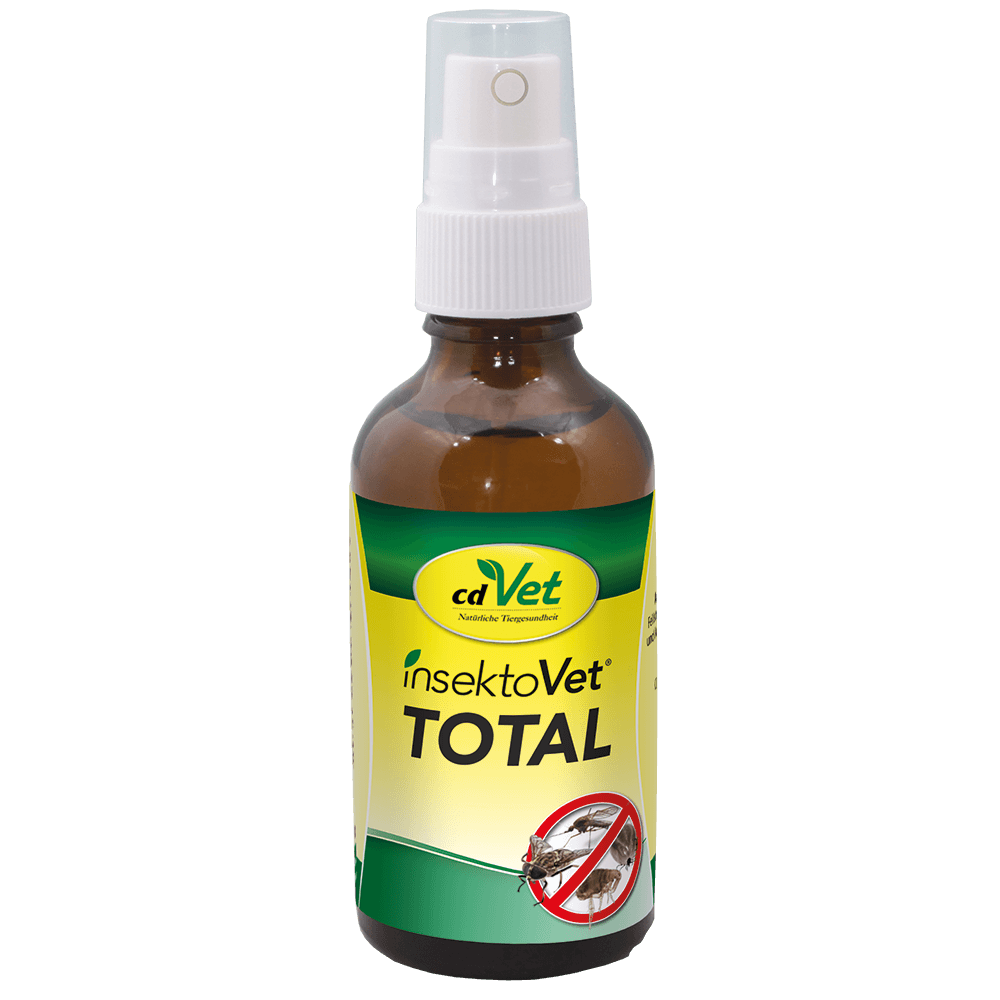
insektoVet Total 50 ml
Care product for animalsFragrance oil spray for animal-specific scent masking against nuisances - from flea, mosquito and horsefly to tickWith insektoVet Total, cdVet has developed a revolutionary product that effectively and sustainably masks your pet against summer nuisances from ticks and fleas to horseflies and mosquitoes. The basis for insektoVet Total is a unique combination of various essential oils, which are an impenetrable firewall for the highly sensitive olfactory organs of insects without straining the olfactory nerves of humans and quadrupeds.insektoVet Total is gentle to the fur and skin of the animals, has a long-lasting and intensive effect - a MUST for every pet owner.masks animal‘s own scentalso suitable for young animals (from 4 months on)pure plant based - 100% naturalpleasant, fresh scenteasy application, ready to useExpert tip: Of course, insektoVet Total can be combined with our other cdVet products such as insektoVet Herbal and insektoVet Coconut-Black Cumin-Oil.Composition: cedarwood oil, lavender oil, clove oil, juniper berry oil, citronella oil.Application recommendation: Shake before use. Spray on 1-2 x daily against the fur line, dampen fur evenly, then massage in. Do not spray the face and eye area directly, but treat accordingly with still wet hands.Contains linalool, linalyl acetate, eugenol, beta-caryophyllene, (-)-Pin-2(3)-ene, citronellal, geraniol and d-limonene. May cause allergic reactions. Avoid direct contact with eyes and mucous membranes! Harmful to aquatic organisms, with long-term effect. Keep out of the reach of children. Dispose of contents / container to a recognized waste disposal facility.
Content: 0.05 Liter (€279.00 / 1 Liter)
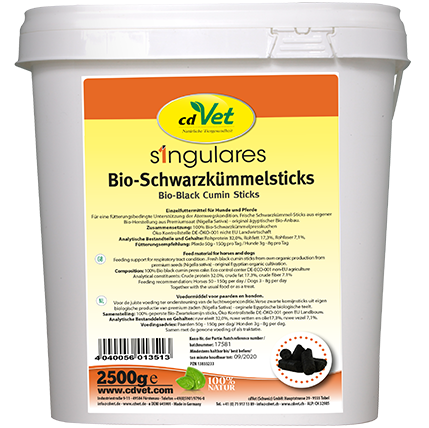
Singulares Bio black cumin sticks 2,5kg
Feed material for horses and dogsFeeding support for respiratory tract conditionBio Black Cumin sticks can contribute to a positive change in the gastrointestinal tract through feeding.This milieu change takes bacteria and fungi the food basis and can make their settlement in the gastrointestinal tract more difficult, the physiological intestinal flora is strengthened.These positive feeding properties of the sticks are based on the carvone contained in the essential oil. Through the excellent properties of the residual oil and the contained roughage, the natural intestinal flora can be additionally supported. A good intestinal flora can contribute to self-regulation when the immune system is disturbed.In addition, the oils contained can nutritionally support the respiratory condition.- Fresh black cumin sticks from own organic production- From premium seeds (Nigella Sativa), original Egyptian organic cultivation- Very high residual oil content 16 - 17% due to the special cdVet cold pressing process- Due to this cdVet cold pressing, organic black cumin oil is gently extracted from the seeds and the valuable press cake is produced- Free of preservatives or other additives- High proportion of unsaturated fatty acids- The sticks contain, of course, all the active ingredients, which are also found in the black cumin oil- Feeding-related support of the respiratory conditionComposition: 100% Bio black cumin press cake.Eco control center DE-ECO-001 non-EU agriculture.Analytical constituents: Crude protein 32.0%, crude fat 17.3%, crude fiber 7.1%.Feeding recommendation: Horses 50 - 150g per day / Dogs 3 - 8g per day.Together with the usual food or as a treat.
Content: 2.5 Kilogramm (€7.98 / 1 Kilogramm)
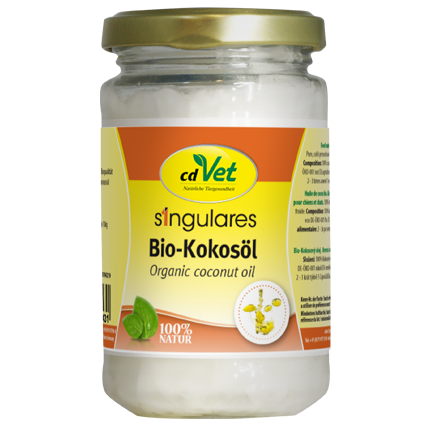
Singulares BioCoconut Oil 200ml
Feed material for dogs,cats, rodents, birds, reptilesPure VIRGIN coconut oil in organic quality, cold-pressedSingulares Organic Coconut Oil is a pure natural product and is gained through gentle, cold pressing. It is characterized by a wonderfully fresh and mild coconut aroma and flavour.It also has a high proportion of valuable MCT - fatty acids (medium-chain fatty acids), and caprine acid, lauric acid, Caprylic acid. Singulares Bio-Coconut oil is up to about 26 ° C and melts at higher temperatures.It is stored at room temperature, protected from light.• In the glas• 100% pure organic coconut oil• 100% natural raw food quality• 100% freshly harvested organic coconuts• not refined, not deodorised, not hardened, not bleachedExpert Tip: Singular Organic Coconut Oil covers the odor of the animal. For that, a pea or hazelnut-sized quantity of coconut oil (depending on the size of the animal) is rubbed in the hands, and then coated over the coat of the animal.Composition: 100% VIRGIN coconut oil.Eco-inspection point DE-ECO-001 not EU argriculture.Feeding recommendation: 2 - 3 times a week 1 teaspoon per 10 kg of body weight.
Content: 0.2 Liter (€54.75 / 1 Liter)
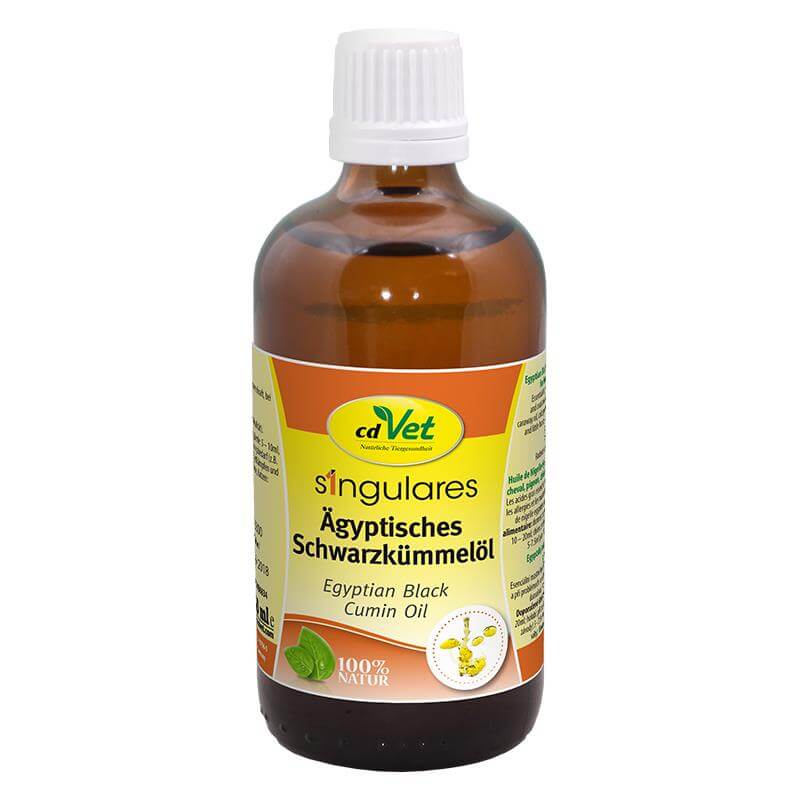
Singulares Egyptian Black Cumin Oil 100 ml
Feed material for horses, pigeons, dogs, and other animalsEssential fatty acids as a feed building block for the defense force, for allergies, and for coat and skin problemsRich in valuable, natural vitamins and essential fatty acids, Singulares Egyptian Black Cumin Oil provides important feeding building blocks for defense. It is also used to support strong performance requirements. • Egyptian black cumin oil from our own production, cold-pressed • From premium seeds (Nigella sativa), original Egyptian cultivation • High content of unsaturated fatty acids • Feeding-related support of the respiratory tract conditionComposition: 100% Egyptian black cumin oil, cold pressed.Analytical constituents: Average fatty acid content: linoleic acid 56.9%, alpha-linolenic acid 0.3%.Feeding recommendation: Add daily to the feed. Ponies/small horses: 5-10 ml. Large horses: 10-20 ml. Pigeons (in case of increased performance requirements, e.g. before and during breeding, in moulting or before competitions and breed shows): 5-7.5 ml/kg feed. Dogs: 2-6 drops depending on body weight. Rodents/ornamental birds: 1-2 drops.Not suitable for cats!Store it cool and dark! Once opened, use within 6 weeks!
Content: 0.1 Liter (€149.50 / 1 Liter)
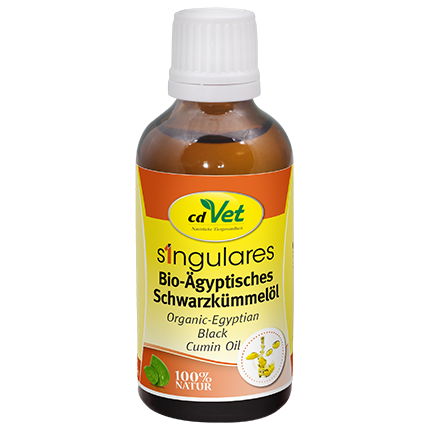
Singulares Organic Egyptian Black Cumin Oil 50 ml
Feed material for horses, pigeons, dogs, and other petsEssential fatty acids as a feed building block for the defense force, for allergies, and for coat and skin problemsRich in valuable, natural vitamins and essential fatty acids, Singulares Organic Egyptian Black Cumin Oil provides important feeding building blocks for defense. It is also used to support strong performance requirements. • Fresh organic black cumin oil from our own manufacture • From premium seeds (Nigella sativa), original Egyptian organic cultivation • High content of unsaturated fatty acids • Feeding-related support of the respiratory tract conditionComposition: 100% pure Egyptian organic black cumin oil (cold pressed).From controlled organic cultivation. Eco-Control-Center DE-ÖKO-001, non-EU agriculture.Analytical constituents: Average fatty acid content: linoleic acid 56.9%, a-linolenic acid 0.3%.Feeding recommendation: Add daily to the feed. Ponies/small horses: 5-10 ml. Large horses: 10-20 ml. Pigeons (in case of increased performance requirements, e.g. before and during breeding, in moulting or before competitions and breed shows): 5-7.5 ml/kg feed. Dogs: 2-6 drops depending on body weight. Rodents/ornamental birds: 1-2 drops.Not suitable for cats!Store it cool and dark! Once opened, use within 6 weeks!
Content: 0.05 Liter (€199.00 / 1 Liter)
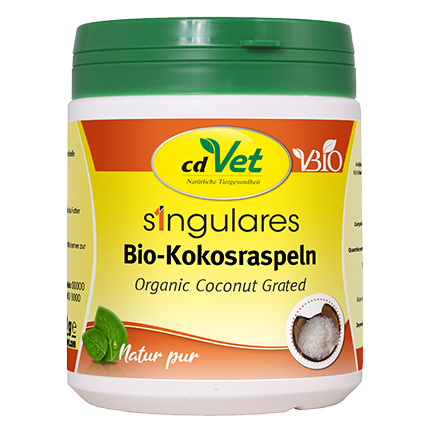
Singulares Organic Coconut Grated 250 g
Feed material for dogs and cats100% pulp in raw food qualitySingulares Organic Coconut Grated from cdVet consists of 100% fresh pulp and is free of additives such as preservatives, colors or flavors. Since it is only dried and not heated after harvesting, all important nutrients are preserved. Grated coconuts are naturally free of lactose and gluten, so that they can also complement the diet of allergy sufferers.High content of dietary fiberSuitable for a vegetarian and vegan dietVery good acceptanceComposition: 100% grated bio coconut, Organic Control Center DE-ECO-001 Non-EU-Agriculture.Analytical constituents: crude fat 66.6%, crude protein 6.7%, crude fibre 14.9%.Feeding recommendation: Give 0.5 m.s. per 10 kg body weight 3-4 times a week over the feed. 1 m.s. (measuring spoon) corresponds to approx. 1.3 g. The information is only a guide. Fresh water should always be available.Store cool and dry.
Content: 0.25 Kilogramm (€43.80 / 1 Kilogramm)
If nothing is done about parasites, serious health problems can arise in horses. Untreated parasite infestation can lead to significant weight loss, malnutrition, digestive disorders and loss of performance. In advanced cases, even life-threatening conditions such as severe colic or anemia can occur. It is therefore crucial to take preventive measures to protect the health of horses.
A parasite infestation in horses can manifest itself through various symptoms. These include weight loss, dull coat, reduced performance, diarrhea, colic, loss of appetite and visible restlessness or itching.
The frequency of deworming for horses varies and should be tailored to the individual needs of the horse and depends on factors such as the risk of infection, grazing and the horse's state of health. In general, it is advisable to check the horse's feces for the presence of parasites using a laboratory test before using a worming treatment.
Horses can have several types of parasites, including internal parasites such as intestinal worms (strongylides, roundworms) and lungworms, which are ingested through food or grass. External parasites include lice, mites and flies that live on the horse's skin or coat. Ticks and horseflies are other examples of parasites that can transmit disease. Proper parasitic control, including regular deworming and preventative measures, is important to keep horses healthy.
Various preventive measures can be taken against parasites in horses. These include a clean stable environment to minimize external parasites and the use of insect-repellent products such as fly masks. In addition, essential oils (e.g. in our ZeckEx SpotOn) can be used to mask odors. The horse can be given herbs through its diet that have a high proportion of bitter and tannin substances and thus ensure an intestinal environment that is hostile to worms. These are contained, for example, in our 'EquiGreen WK-Mix' or in the 'Leckstein Wilde Kräuter'. A balanced diet and regular care also help to strengthen the immune system and protect against parasites.
